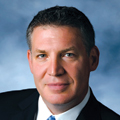
As IAPMO’s director of special services, Dave Viola oversees the association’s green building and sustainable construction codes initiative and is active in the education, code development, and promotion of IAPMO programs and services, including Uniform Plumbing Code, Uniform Mechanical Code, Green Plumbing and Mechanical Code Supplement and Uniform Solar Energy Code. Viola recently took time to talk to pme about a variety of topics, including green technology, IAPMO’s involvement with BIM and the association’s acquisition of Radiant Professionals Alliance.
pme: Has the green phenomenon peaked, or is there still more growth to be realized?
DV: Green has not peaked by any means. The impending water crisis we will face here in this country and globally will provide incredible incentive and opportunity for corporations, entrepreneurs and inventors to develop new technologies to meet the need of a thirsty planet for years to come. While it’s difficult to predict specific technological advancements, we do anticipate seeing new leak detection and metering technologies that will provide much-needed insight into how water is being used within domestic and commercial buildings. We also believe solar thermal and radiant panel technologies have great potential for advancements in the short-term future.
pme: While we're on the subject of radiant, what are the benefits of Radiant Professionals Alliance coming under IAPMO's umbrella?
DV: IAPMO undertaking RPA further demonstrates IAPMO’s commitment to the continuous progress of the HVAC industry. IAPMO is looking forward to representing the radiant and hydronics comfort industry with codes and standards development, as well as with programs for installation education and consumer education. This opportunity will provide the needed support system sought by RPA that will deliver sustained growth, strong financial performance, and increased market reach domestically and internationally, while at the same time making IAPMO a stronger and more invigorating organization.
pme: Are there particular products/technologies in recent years that have generated more buzz and controversy than others?
DV: It is a fact new technologies in the plumbing industry often are met with controversy. Overwhelmingly, these controversies revolve around the industry’s prime directive of ensuring health and safety is never compromised when new technologies are introduced into the marketplace. In recent years, we have seen a great deal of debate surrounding, for example, the efficacy of non-water-consuming urinals, high-efficiency toilets, the green or un-green use of food grinders, and alternate water-use systems such as rainwater catchment and graywater. In each of these cases, the industry is continuously reminded about the systemic interrelationships between all of the various components installed in a plumbing system and the often-surprising impact human behavior has on these systems.
pme: One of IAPMO's objectives moving forward is to develop electronic codes that integrate into the developing BIM system. What is the strategy behind this?
DV: IAPMO is following the development of BIM very closely. Our IT department is tracking this ongoing development in order to ensure the highest level of interoperability of our codes within the BIM platform. The real work ahead for BIM is in the development of a standard set of code interpretations and data structure methodologies that will allow for real-time analysis in 3D models. These capabilities still are very much in their infancy, but progress is being made. Ultimately, IAPMO fully recognizes the importance of BIM as a critical tool for the construction community. The electronic code-checking capability associated with BIM will result in fewer delays in obtaining required approvals, greater consistency in code enforcement across the country and fewer errors.
pme: How important is it for a plumbing professional to be actively involved in the code-development process?
DV: Anyone may propose code provisions and participate in the discussion and debate on proposals, as well as changes proposed by others, in a series of technical committee meetings and conferences. All eligible members in good standing may vote on changes to the Uniform Codes. Codes require regular changes to utilize new developments, products and safety technology. When we say everyone has a voice and a vote, our process backs that up.
pme: Your advice for a young engineer/specifier just entering the field?
DV: Today, a number of engineers and specifiers have expanded their scope of expertise to include sustainable plumbing systems in order to set themselves apart from their peers. However, new entrants into the field will have no choice but to have a firm grasp of emerging sustainable technologies, along with their capabilities and impacts as the shift to more sustainable construction becomes mainstream.
